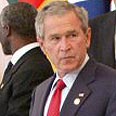
Bush: Terror attacks on Israel cause of instability
US president accuses Syria of trying to 'get back' into Lebanon by supporting Hizbullah, accuses Damascus and Iran of inspiring 'terror attacks' against Israel; later, US Senate adopts resolution condemning Hizbullah, Hamas, Syria and Iran. US Secretary of State Rice to visit region next week
Bush told reporters that the "root" cause of the conflict must be addressed.
"It can be addressed internationally by making it clear to Syria they've got to stop their support to Hizbullah," he said, during a meeting with lawmakers at the White House.
"Syria is trying to get back into Lebanon it looks like to me," he added.
"We passed United Nations resolution 1559 and finally this young democracy or this democracy became whole by getting Syria out. And there are suspicions that the instability created by the Hizbullah attacks will cause some in Lebanon to invite Syria back in."
Bush said the root cause of the instability was "terrorism and terrorist attacks on a democratic country," in apparent reference to Israel.
"Part of those terrorist attacks are inspired by nation-states like Syria and Iran. And in order to be able to deal with this crisis, the world must deal with Hizbullah, with Syria, and to continue to work to isolate Iran," he added.
On Tuesday night, the US Senate expressed its support of Israel by adopting a resolution condemning Hizbullah, Hamas, Syria and Iran.
"The Senate has spoken loud and clear: Israel has the right to defend itself against aggression. While I urge the Israeli government to act carefully, there should be no doubt as to where we stand in this conflict," said Senate Majority Leader Bill Frist.
Meanwhile, Ynet has learned that US Secretary of State Condoleezza Rice will visit the region at the beginning of next week. Sources in Washington told Ynet that her visit will not be aimed at forcing the sides into a ceasefire.
Rice calls for lasting Mideast ceasefire
According to the sources, Rice's visit will be aimed at expressing her solidarity with Israel and initiating initial contacts ahead of finding a solution to the problems in Lebanon: Implementing Resolution 1559 to dismantle the armed militias and looking into the possibility of placing an international force in south Lebanon that will be deployed together with the Lebanese army.
In her visit to the region Rice is set to meet with Prime Minister Ehud Olmert and other Israeli officials, as well as with Palestinian President Mahmoud Abbas. Rice will also visit moderate Arab countries – Egypt, Jordan and Saudi Arabia – and will meet with Lebanese Prime Minister Fouad Siniora.
Earlier Tuesday, Rice said any ceasefire in Mideast fighting ought to be based on fundamental changes that could lead to a lasting impact.
"We all want a cessation of violence. We all want the protection of civilians. We have to make certain that anything that we do is going to be of lasting value," Rice said.
But Rice said there should be a "conducive environment" for a ceasefire. That, she said, would involve implementation of a standing UN Security Council resolution and the deployment of the Lebanese army to the borders, as well as the introduction of a strong peacekeeping operation.
The Council resolution in 2004 led to withdrawal of Syrian forces from Lebanon. But its call for disarming terror groups has not been heeded.
Rice, at a joint news conference with Egyptian Foreign Minister Ahmed Aboul Gheit, also indicated she would not be going to the troubled region immediately. She said she was primed to take the trip when it will be "helpful and necessary."
Rice's skepticism about trying to work out an immediate, makeshift ceasefire reflects views shared by the Israeli government in seeking fundamental changes to guard against another flare-up.
These include ensuring southern Lebanon does not remain a launching pad for attacks on Israel.
Gheit, for his part, did not qualify his support for a ceasefire. He said one was under discussion in diplomatic circles.
Snow: Hizbullah started this
Defending US efforts to quell the conflict, White House spokesman Tony Snow said it was up to Syria and Iran, Hizbullah's key supporters, to rein in the terror group.
Analysts have said Iran may be using its clout with Hizbullah to show it can hurt US allies and interests if Washington goes ahead with efforts to get UN sanctions over Tehran's nuclear program.
"Israel is proceeding in the manner it sees fit to defend itself and its territory," Snow told reporters. "We've got to remember who's responsible for this – Hizbullah. Hizbullah started this."
"And Iran and Syria, its backers, ought to be using their influence to get Hizbullah to stop firing rockets and return the soldiers," Snow added.
He pointed the finger at Syrian President Bashar Assad over the crises raging in Lebanon and Gaza.
"The president believes that at this point President Assad is not doing what he can to create stability, which would be to stop housing terrorist organizations and providing safe haven for them and permitting people to conduct terrorist operations or at least planning on his soil," he said.
Snow reiterated the US appeal for Israel to act with restraint, saying, "We lament the death of innocents, whether they be in Israel or in Lebanon or in Gaza or anywhere else."
But he signaled US resistance to pressuring Israel into an immediate cease-fire that would leave Hizbullah's rockets still within range of Israel's northern towns and cities.
"A cease-fire that would leave the status quo ante intact is absolutely unacceptable. A cease-fire that would leave intact a terrorist infrastructure is unacceptable," he said.
Snow said it was important to avoid further destabilization of Lebanon's fragile government but that it was too early to talk about sending a multinational security force to the Israel-Lebanon border.
Yitzhak Benhorin contributed to the report










